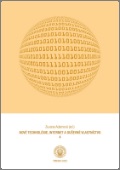Renáta Bačárová
Úplný text príspevku
- Typ dokumentu: publikácia
- Typ príspevku: štúdia
- Jazyk príspevku: slovenčina
- Publikované: 2020
- Formát súboru: PDF
- Veľkosť súboru: 160 kB
In: ADAMOVÁ, Z. (ed.) Nové technológie, internet a duševné vlastníctvo 4. Trnava: Typi Universitatis Tyrnaviensis, spoločné pracovisko Trnavskej univerzity v Trnave a VEDY, vydavateľstva Slovenskej akadémie vied, 2020, s. 90-118. ISBN 978-80-568-0329-5.
Summary: The Copyright Directive introduces several changes apply to many copyright entities. It introduces new exceptions and limitations in copyright related to the text and data mining for the purposes of scientific research, use of works and other subject matter in digital and crossborder teaching activities and the making of copies of works and other subject matter for preservation of cultural heritage. Beneficiaries in this case are research organizations and cultural heritage institutions whose interests are superior to interests of authors or copyright holders. We also consider it essential to resolve the conflict between the economic interests of publishers of press publications and interests of information society service providers. Although critics talk about the introduction of so-called link tax, setting a fair remuneration of publishers for the use of digital content could lead to a consensus among stakeholders. It is questionable how award of a share of the remuneration to publishers is reflected in the income of the authors who gave a license for publishers. Article 17 of the Copyright Directive appears to be the most problematic from the perspective of balancing the interests of digital single market players. There is a primary responsibility of online content-sharing service providers for user-uploaded content by reason of performs an act of communication to the public or an act of making available to the public. The issue of monitoring the content provided is also linked to the liability regime, although the Copyright Directive explicitly excludes the introduction of a general monitoring obligation. If the provider of an information society service wants to avoid liability for illegal content, it will have to take some precautionary measures. We perceive the vague of terms as problematic in the implementation of the Copyright Directive in the legal systems of EU states.
URL: http://ntidv.iuridica.truni.sk/archive/ntidv-4/NTIDV-4-Bacarova-Renata.pdf
Bibliografická citácia
BAČÁROVÁ, R. Protichodné záujmy subjektov autorského práva ako príčina konfliktov v autorskom práve na digitálnom jednotnom trhu Európskej únie. In: ADAMOVÁ, Z. (ed.) Nové technológie, internet a duševné vlastníctvo 4. Trnava: Typi Universitatis Tyrnaviensis, spoločné pracovisko Trnavskej univerzity v Trnave a VEDY, vydavateľstva Slovenskej akadémie vied, 2020, s. 90-118. ISBN 978-80-568-0329-5.
